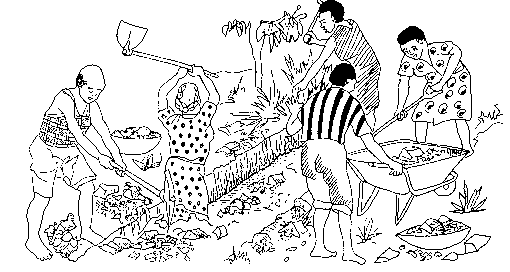Tweet
Translations:
'العربية / Al-ʿarabīyah
Bahasa Indonesia
Català
中文 / Zhōngwén
English
Español
Filipino/Tagalog
Français
Ελληνικά / Elliniká
Italiano
日本語 / Nihongo
بهاس ملايو / Bahasa Melayu
Polszczyzna
Português
Română
Русский
Türkçe
Other formats:
Other Pages:
Modules
Site Map
Key Words
Contact
Utility Documents
Useful Links
Sociology
MANAGEMENT TRAINING TIPS
by Phil Bartle, PhD
Dedicated to Gert Lüdeking
Workshop Handout
A short collection of tips to improve management
- We (the community group) need vision. The community must decide, as a whole, what it wants to do. There are many possible goals, but the community must be unified and choose what it wants to do. Trainers can use a quotation from Alice in Wonderland to illustrate this. "If we do not know where we are going, then any road will do." (Lewis Caroll). Without a vision for where the community wants to go, it might as well stay where it is or how it is (with its apathy, poverty, disease and discomfort) at present.
- Once a goal and a direction are chosen, it is necessary to make some planning decisions as to how to reach or get closer to that end. This can be illustrated during training by a catchy phrase: "If we fail to plan, then we plan to fail." (Also see "Slogans"). If success or winning can be defined as reaching the goal, then it is necessary to plan in order to reach that goal. (Of course the goal, or how it is interpreted, may change during the process of reaching it, and certainly after it is reached).
- The trainer can remind the group that planning means the series of thought processes that will lead the group for where (or in what condition) it is now, to where (or in what condition) is envisaged when the goal is reached. those though process must be logical and consistent, and lead from the present actuality to the future desired result. The trainer can point out that: "We plan backwards in time (Start with the end and end with the start)." Start planning by identifying where we want to go, then ask what steps are needed in order to get there. Every step from the current situation must logically link with the next until the desired end is reached.
- During the process of identifying and selecting strategies, the group is encouraged to make the best or most efficient and effective use of what they have to get what they want. Efficiency must not be rejected, although it can be interpreted in many ways. Efficiency can be defined as being able to "Get more output for less input (maximize our efficiency)" One catchy phrase that may illustrate this is, "Do not work hard; get results." Here the admired value of "hard work" (the means or the input) is shown to be less important than the result of that work (the end or output). It is not intended as an encouragement to be lazy, but as an encouragement to use resources (including one's own labour) wisely, and therefore (in this context) efficiently.
- A participatory and inclusive decision making process can tap hidden resources that would otherwise be lost by a dictatorial decision making style. The trainer teaches to, "Involve everybody in decisions." One (imperfect) human, even if boss or chief, has less information, experience, wisdom, than the whole concerned group, including the quiet or humble ones. In terms of democratization, it is the right of every community member to participate; in terms of maximizing the strength of a community, identifying the most of its resources, and finding creative and previously overlooked strategies, involving all makes good management sense.
- The trainer must remind the community that it must aim to "stand on its own feet." Dependency, and reliance on outsiders' help, resources, and even direction, is simply not sustainable (the outsiders leave after some time), as well as a weakness and vulnerability. Encourage self reliance; it is an obligation or duty as well as a right. Another catchy phrase can be used here: "If you blame others, you give up your power to change," (Ray Anthony). The trainer must never be duped by the dependent plea, "We are too poor and we need outside help." Every (every) group or community, no matter how poor, if it is composed of live humans, has resources it can tap, most of which are hidden. The real poverty is in the lack of knowing what they are, not in their absence.
- There is no free lunch (nothing is for nothing). Volunteer labour and public donations must be paid for, even if not in purely monetary currency. That payment may be public recognition, encouragement, praise and acknowledgement. Management trainers in corporations have pointed out that even paid labour does not participate fully or produce the most just on the basis of salaries or wages; recognition, praise and encouragement go a long way to get the best output from both volunteers and paid labour. Recognize contributions, praise honestly, emphasize the positive, ignore the negative, do not criticize.
- We cannot stand still. If we are not going forward, then we will slip backward. Human society is dynamic, it is always changing. It is impossible to solve any problem, "once and for all," (that is a fallacy). What may be today a solution to a problem, if it is continued to be used, may tomorrow be the problem.
Of course there are many other lessons and principles in management training. This web document cannot list or describe them all. You are invited to identify more.
As you do, add them to your personal professional bag of tricks in mobilizing, and also share them with us and with your colleagues.
––»«––
Community Action; Digging a Trench
 |